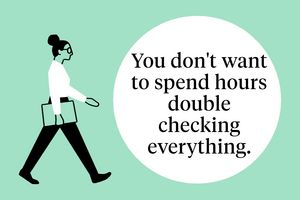Careers May 1, 2019
How Introverts Can Learn to Love Networking
Four tips for turning this trait into a “networking superpower.”

Lisa Röper
For introverts, networking events can be a source of dread. The format itself—a crowd full of strangers hoping to make a strong impression—is anathema to those who flourish in environments that are quieter or feel less transactional.
But, according Holly Raider, a clinical professor of management and managing director of executive education at the Kellogg School of Management, introverts can be just as skilled at networking as extroverts if they learn to ignore the crowd and focus on shaping individual conversations.
“I am frequently asked how to build networks if you are an introvert and dislike networking events,” Raider says. “My impression is the people asking believe they just need to accept that building a business network is a necessary part of business, or that they simply need to figure out how to manage anxiety. Instead, introverts can learn to thrive in the experience more than they might ever have imagined. And their introversion can be harnessed as a networking superpower.”
She offers four tips for introverts looking to succeed at—and actually enjoy—networking.
Prepare a Repertoire of Questions—but Maintain a Curious Mindset.
Part of what makes networking tough is coming up with non-superficial things to say on the spot. But there is no reason you can’t plan ahead, says Raider. She recommends developing a “repertoire” of questions, including conversation starters, follow-ups, and open-ended questions, each of which express interest and give the addressee a wide degree of latitude in how they might respond.
“You want people to feel at ease and engaged, so ask questions that will help nurture dialogue,” Raider says. “Avoid questions where the answer might be strained, socially isolating, or a dead end. People will have a lot to say—and they’ll enjoy talking to you—if they’re prompted in the right way.”
When it comes to conversation starters, Raider suggests starting with something expected, such as “What are your responsibilities?” But she recommends having second and third questions that go a bit deeper, such as “What is capturing your focus these days?” or “What interesting trends are you tracking?”
By listening carefully—often a strong quality of introverts—you will pick up clues that can help you make your next questions even more interesting to answer.
“These follow-on questions will help you feel confident as a conversation partner while helping the other person to be a good raconteur,” Raider says.
Similarly, if you listen closely to what excites others, you are more apt to find shared interests, values, and experiences. This can turn otherwise transactional meet-and-greets into forums for building relationships, since people tend to make and sustain connections with others who are similar.
“If you don’t seem genuinely interested in the answer, you might as well not ask the question,” Raider says. “But if you’re truly curious, you don’t have to fake anything, and that will show.”
You should also prepare to respond to these questions yourself—after all, it is natural for a conversation partner to volley back whatever you’ve just asked them. Reflect on what excites you most in your work, studies, hobbies, or family. Having this clarity in advance will make you more confident and genuinely engaging to others.
Choose Conversation Partners Wisely
There’s a widespread assumption that people are usually interested in networking up—an assumption that deepens the introvert’s sense that networking is a dirty business.
“The stigma around networking has to do with the sense that it’s all about individual ambition,” Raider says. “We picture a cocktail party where everyone’s just out to impress or climb to the next rung.”
At crowded networking events, it is unlikely that anyone is going to have a long, relationship-building conversation with the CEO. Too many people are trying to get a moment with her.
“Introverts can learn to thrive in [networking events] more than they might ever have imagined. And their introversion can be harnessed as a networking superpower.”
“Recognize the dynamics in the room and set expectations accordingly, Raider says. “Say hello to the CEO and move on to allow others in. This setting is ideal for deepening a relationship with someone less conversationally in demand.”
These settings are also helpful for strengthening relationships with people in other parts of your organization, or perhaps even in other industries where your connections may prove valuable. If you work in commercial real estate, for example, having a connection on the government side who knows the regulatory environment will give you a competitive advantage.
“By building connections to peers in other areas of your company—or other companies—you’ll get more substantive and actionable information,” Raider says. “You can differentiate yourself by building diverse social capital. It helps you come up with better ideas, forestall problems, and forge collaborations—making you more valuable to your organization and giving you reason to catch the eye of senior colleagues.”
It is also a lot easier to build relationships laterally and down instead of vertically. People above you have less time to give, and they might assume you’re only interested in furthering your career. With a peer or mentee, there is potential for mutual benefit.
“You gain knowledge of trends, glean perspectives on the junior employee experience to help improve your team or organization, and get a chance to flex your mentoring muscles—all of which are valuable,” Raider says.
Focus on Relationships, Not Business Cards
A critical strategy for successful networking, especially for introverts, is to keep your priorities in mind. Remember: the goal of networking isn’t to “win” by collecting the most business cards or LinkedIn contacts. Research and experience show that small, intimate networks are actually more powerful than larger, facile ones.
The point of networking is to build a foundation for relationships. And because introverts tend to do better in small groups or one-on-one conversations, it is a good idea to invest in those exchanges rather than superficially work the entire room.
“You can shape how you engage at any event, whatever it is,” Raider says. “You don’t need to master the forest; you can approach it with the attitude that you’ll get to know a bit of the flora. A lot of anxiety comes from a self-imposed expectation to meet everyone, or as many people as possible. If your goal is to get to know one or two people, you can do that in a meaningful way and stay within your comfort zone.”
There is no need to rush this process—you will be better off if you slow things down and put some thought into how you want to deepen your connection with someone.
Introverts, when keen observers, may also be especially good at facilitating connections between other people, whether it is at an event or sometime in the future. When they do, they enhance their own network in the process by being recognized as a connector.
“There’s a skill to this that comes with experience,” Raider says. “One of the most powerful things you can do in networking is to introduce people to each other to help someone solve a problem or foster collaboration.”
Know When to Move On
A common mistake introverts make at networking events is getting so absorbed in a one-on-one conversation they don’t realize when it’s time to move on. Thus, at any networking event, it is important to have a strategy to help you transition out of a conversation, with the intention of continuing the conversation later by email, Skype, or over a coffee.
Raider has a simple formula for transitioning out of a conversation: offer appreciation for what you have heard, express an interest in continuing the conversation at another time, and exchange information.
“Be cautious not to overstay in a conversation. It is better to leave them looking forward to another discussion than looking over your shoulder for the next conversation partner.”



